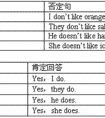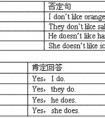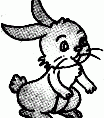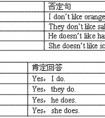句子大变身。按要求改写句子。1. I'm 165 cm tall. (就画线部分提问)__________________________________________________________________________________2. I am tir-六年级英语
题文
| 句子大变身。按要求改写句子。 |
| 1. I'm 165 cm tall. (就画线部分提问) __________________________________________________________________________________ 2. I am tired. (变为一般疑问句) __________________________________________________________________________________ 3. Ann does her homework every day. (就画线部分提问) __________________________________________________________________________________ 4. She is 50 kg. (就画线部分提问) __________________________________________________________________________________ 5. I failed my math test. (变为一般疑问句) __________________________________________________________________________________ 6. I went fishing. (就画线部分提问) __________________________________________________________________________________ 7. She cleaned the room yesterday. (变为否定句) __________________________________________________________________________________ 8. Was today a fun day? (作肯定回答) __________________________________________________________________________________ |
答案
| 1. How tall are you? 2. Are you tired? 3. What does Ann do every day? 4. How heavy is she? 5. Did you fail your math test? 6. What did you do? 7. She didn't clean the room yesterday. 8. Yes, it was. (答案不唯一) |
据专家权威分析,试题“句子大变身。按要求改写句子。1. I'm 165 cm tall. (就画线部..”主要考查你对 一般疑问句,疑问代词,否定句,疑问词组 等考点的理解。关于这些考点的“档案”如下:
一般疑问句疑问代词否定句疑问词组
考点名称:一般疑问句
- 一般疑问句:
是疑问句的一种。它是以be动词,have或助动词、情态动词开头,用yes(是)或no(否)来回答的句子。
其结构是:系动词be/助动词/情态动词+主语+其他成分
一般疑问句的肯定形式为:
助动词+主语(+实义动词)。肯定答语用“yes+可定结构”。
一般疑问句的否定形式为:
助动词构成的缩写否定词+主语(+实义动词)。否定答语用“no+否定结构”。
例:
— Do you like this story-book? 你喜欢这本故事书吗?
— Yes, I do. 喜欢。/ No, I don’t. 不喜欢。
— Is he a student? 他是一名学生吗?
— Yes, he is. 是,他是。/ No, he isn’t. 不,他不是。 一般疑问句的改写:
一、含有be动词的一般疑问句,通常把be动词调到句首。例如:
陈述句:They are in the swimming pool.
一般疑问句:Are they in the swimming pool?
注意:一般疑问句句末要用“?”。
二、含有情态动词的一般疑问句(can, may...),把情态动词调到句首。例如:
陈述句:He can drive a car.
一般疑问句: Can he drive a car?
三、含有have的一般疑问句,have译为“有”。一般疑问句式有两种形式:
1.把have/has调到句首。例如:
陈述句:Tommy has a computer.
一般疑问句:Has Tommy/he a computer?
2.加助动词do/does,第三人称单数用does,其他人称用do。其句型为:Do/Does + 主语 + have...?
例如上句可变为: Does Tommy have a computer?四、一般动词的一般疑问句,也要借助助动词do/does,第三人称单数用does,其余人称用do。
其句型为:Do/Does + 主语 + 动词原形+其它?
陈述句:Amy speaks English.
一般疑问句:Does Amy speak English?一般疑问句的回答:
首先要有人称的改变。当主语为名词时,在答语中要改成其相应的代词。
另外,答语有两种,肯定的回答(用yes)和否定的回答(用no),否定式常用缩写形式。
现在还是让我们分句型一一说明。一、一般疑问句含be动词时,用be动词回答,句末用句号。例如:
-Is Mary your sister?
-Yes, she is. / No, she isn’t.(缩写)二、一般疑问句含有情态动词(can, may, should等)时,用情态动词回答。例如:
-May I come in?
-Yes, you may. / No, you can’t.三、一般疑问句含有have(译为“有”)时,有两种回答方式。
1.直接用have/has回答。
例如:
-Have they any pictures?
-Yes, they have. / No, they haven’t.
2.用助动词do/does回答。
例如:
-Does Millie smoke?
-Yes, she does. / No, she doesn’t.四、一般动词的一般疑问句回答时也用助动词。
例如:
-Do the workers live in London?
-Yes, they do. / No, they don’t.
考点名称:疑问代词
- 疑问代词:
在句子中用来构成特殊疑问句,主要用于询问“何人”、“何事”、“什么”。
常见的疑问代词如下表所示:
疑问代词
替代范围
who
人
whom
人
whose
人
which
人、事、物
what
事、物
考点名称:否定句
- 否定句:
表示否定的句子。必须有否定词。
否定句的构成形式:
a. 谓语为be动词时,“be+not "一名学生。
b. 谓语为实义动词而且没有情态动词和助动词时,“do/ does/ did+not"构成否定。
例:I do not like dancing. 我不喜欢跳舞。
He does not want to go to school. 他不想去上学。
c. 谓语为“情态动词+实义动词”时,“情态动词+not”构成否定。
例:You must not smoke. 你千万不要吸烟。
I can not catch it. 我抓不住它。 - 否定句在英语语法中可以分为九类:
(1)一般否定句
I don't know this. No news is good news.
There is no person(smoking)/not a person/not any person(smoking)in the house.
(2)特指否定
He went to his office, not to see him.
I am sorry for not coming on time.
I don't think/believe/suppose/feel/imagine you are right.
(3)部分否定
All the answers are not right
All is not gold that glitters
I don't know all of them.
I can't see everybody/everything.
Both of them are not right.
(4)全体否定
None of my friends smoke.
I can see nothing/nobody.
Neither of them is right.
Nothing can be so simple as this.
(5)延续否定
You didn't see him, neither/nor did I.
You don't know, I don't know either.
He doesn't know English, let alone/to say nothing of/not to speak of(更不用说)French.
- 最新内容
- 相关内容
- 网友推荐
- 图文推荐
| [家长教育] 孩子为什么会和父母感情疏离? (2019-07-14) |
| [教师分享] 给远方姐姐的一封信 (2018-11-07) |
| [教师分享] 伸缩门 (2018-11-07) |
| [教师分享] 回家乡 (2018-11-07) |
| [教师分享] 是风味也是人间 (2018-11-07) |
| [教师分享] 一句格言的启示 (2018-11-07) |
| [教师分享] 无规矩不成方圆 (2018-11-07) |
| [教师分享] 第十届全国教育名家论坛有感(二) (2018-11-07) |
| [教师分享] 贪玩的小狗 (2018-11-07) |
| [教师分享] 未命名文章 (2018-11-07) |





![____ it got four wheels?[ ]A. Have B. There C. Has-五年级英语](http://www.00-edu.com/d/file/ks/4/1/65/2019-08-31/small2ca0aeba76320ba6f81e40fe83a0e8111567199443.png)
